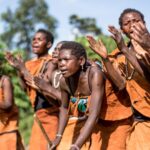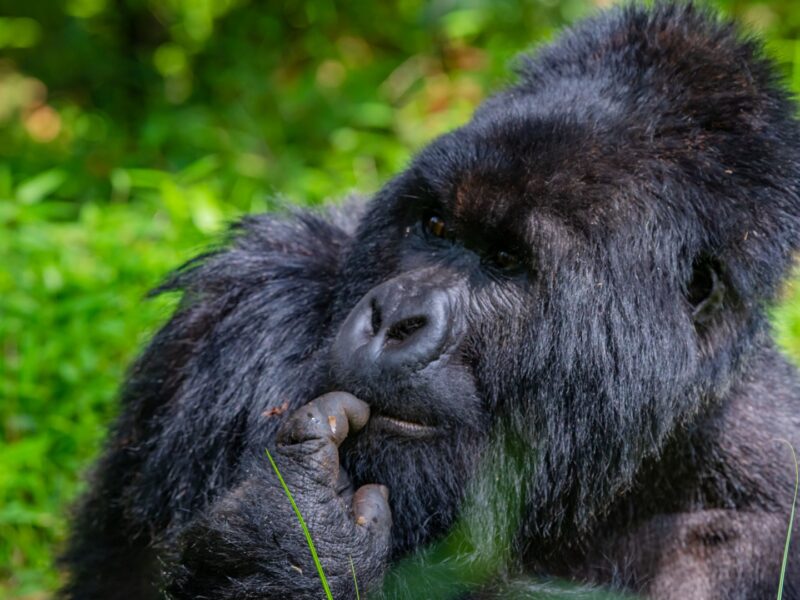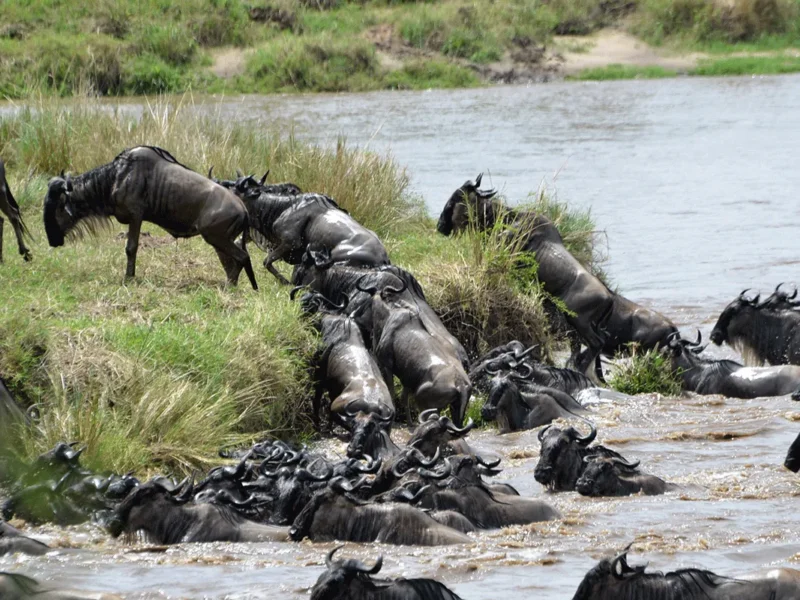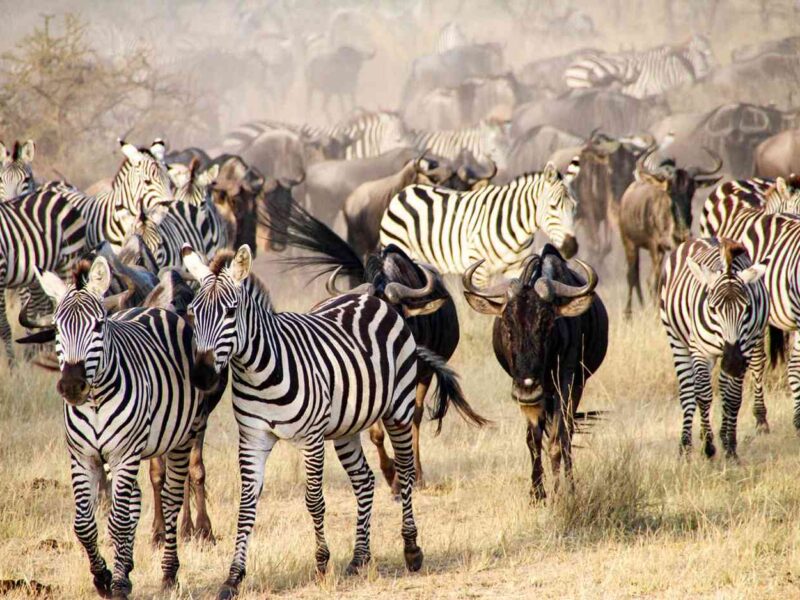The Natural Forest Medicine of Batwa
October 10, 2025
Emotional Connection Between Batwa and Gorillas
October 13, 2025Life of the Batwa After Bwindi and Mgahinga
Life of Batwa after Bwindi and Mgahinga National Park is very different since it was their ancestral home. The Batwa people, once the ancient custodians of Uganda’s mountain rainforests, lived for centuries in perfect harmony with nature.
The deep forests of Bwindi Impenetrable National Park , Mgahinga Gorilla National Park, and Echuya Central Forest Reserve were their ancestral home places where they hunted, gathered fruits, and practiced traditional medicine.
Every sound of a bird, rustle of leaves, and scent of herbs carried meaning.
The forest was not only their shelter but also their identity, their supermarket, and their sacred temple.
However, when these forests were declared protected areas in the 1990s to conserve endangered mountain gorillas, the Batwa were forced to leave.
They were relocated to nearby communities on the edges of the forest, in areas like Ichumbi near Bwindi, Kisoro, and Rubanda districts.
The creation of Bwindi Impenetrable National Park and Mgahinga Gorilla National Park brought global recognition to Uganda for conservation success, but for the Batwa, it marked the beginning of a difficult transition.

Life of the Batwa After Bwindi and Mgahinga
Struggling Between Two Worlds
After being evicted from their forest homes, the Batwa faced immense challenges.
Their entire way of life depended on forest resources food, medicine, and shelter and without access to these, survival became a daily struggle.
The forest had always provided everything freely, but now they had to adapt to a cash-based economy they had never known before.
Many lacked land, education, and skills to engage in farming or business, leaving them vulnerable to poverty and marginalization.
Life outside the forest also meant social displacement.
The Batwa had lived as hunter-gatherers for generations, while the surrounding Bakiga and Bafumbira communities practiced agriculture. Integration was not easy.
The Batwa were often viewed as outsiders, and discrimination became common.
Many families lived in temporary shelters made of mud and grass, with limited access to clean water, health care, or schools.
In some areas, they became labourers on other people’s farms in exchange for food or small payments.
Despite these challenges, the Batwa have shown remarkable resilience.
Some have formed organized communities with the support of government programs, non-governmental organizations, and responsible tourism companies.
They are gradually rebuilding their dignity and identity through education, crafts, and cultural tourism.
Tourism as a Bridge for Hope
One of the most positive changes in recent years has come through community-based tourism.
Recognizing the importance of preserving Batwa culture, organizations include Batwa cultural encounters in Uganda Gorilla Trekking itineraries around Bwindi and Mgahinga.
These experiences allow travellers to meet Batwa families, listen to their stories, and witness their traditional dances, songs, and forest survival skills.
Through these cultural tours, the Batwa earn income that helps support their families.
Visitors pay a small fee that goes directly to community projects — improving housing, education, and health care.
The tours are designed to restore pride in Batwa heritage while educating travellers about the importance of coexistence between humans and wildlife.
For instance, around Ichumbi near Bwindi, travellers who come for Uganda Gorilla Trekking can spend an afternoon visiting a Batwa village.
They learn how the Batwa made fire from dry sticks, used leaves as cups, and discovered natural medicine from roots and herbs.
This interaction provides meaningful cultural exchange and reminds travellers that conservation should include both nature and people.
Education and Cultural Preservation
Education has become a key tool in transforming the future of the Batwa. Many young Batwa children are now attending schools supported by local projects and non-profit organizations.
Learning to read, write, and speak English opens doors to better opportunities in tourism, guiding, and conservation work.
Some have trained as cultural interpreters and guides, leading visitors along the Batwa Trail Experience in Mgahinga National Park.
Through such programs, the Batwa are reclaiming their voice.
They are no longer seen only as victims of conservation but as partners in protecting Uganda’s natural heritage.
Their deep understanding of forest ecosystems is valuable for both tourism and environmental education.
Elders teach traditional songs and dances to the younger generation, ensuring that cultural identity remains strong even outside the forest.
Visitors often find that these cultural performances carry deep emotion not just entertainment, but expressions of longing for a life once lived in freedom among the trees.
When travellers participate, they become part of a greater story of survival, resilience, and revival.
Challenges That Still Remain
Despite progress, the Batwa still face many challenges today. Land ownership remains one of the biggest issues.
Most Batwa families live on small, donated plots or rent land from neighbours, making it hard to grow food or build permanent homes.
Access to clean water, health care, and education also remains limited in some areas.
Some communities continue to experience social exclusion, while others struggle to maintain cultural identity in a changing world.
As younger generations grow up away from the forest, traditional knowledge of plants, medicine, and hunting gradually fades.
Without continued support, this unique heritage could be lost forever. This is why responsible tourism matters.
Every visitor who books a Uganda Gorilla Safari or a Batwa cultural experience through a trusted company like Ngeye Tours and Travel contributes to improving Batwa livelihoods.
A small choice made by a traveller can help keep a culture alive.
A Future of Partnership and Conservation
The story of the Batwa today is one of transformation. Though their past is filled with hardship, their future holds hope.
The Batwa have become important partners in conservation, sharing their knowledge about forest plants, wildlife behaviour, and traditional sustainability.
By working alongside park authorities and tourism operators, they help protect the same forests that once protected them.
For travellers visiting the Batwa communities offers more than cultural learning. It provides a deeper understanding of how conservation and culture can coexist.
The experience teaches empathy, respect, and appreciation for the resilience of Indigenous people.
When travellers ask, “When is the best time to go for a Uganda Gorilla Safari?” or “What else can I experience beyond Gorilla Trekking?”, the answer often includes the Batwa community visits.
Combining Uganda Gorilla Trekking with Batwa cultural experiences transforms an ordinary safari into an extraordinary journey of humanity and connection.
Restoring Balance Between People and the Forest
The life of the Batwa after leaving Bwindi and Mgahinga is a story of struggle and strength.
It reflects the complex relationship between conservation and human rights.
Yet, through education, community tourism, and global awareness, the Batwa are finding a voice once lost.
Travelers who engage with them not only gain unforgettable memories but also support the balance between wildlife preservation and cultural survival.
The forest that once gave them life still holds their spirit and through respectful tourism, that spirit continues to thrive.
Written by Ngeye Tours and Travel your trusted guide to authentic Uganda Gorilla Trekking, cultural encounters, and African safari experiences that make a difference




